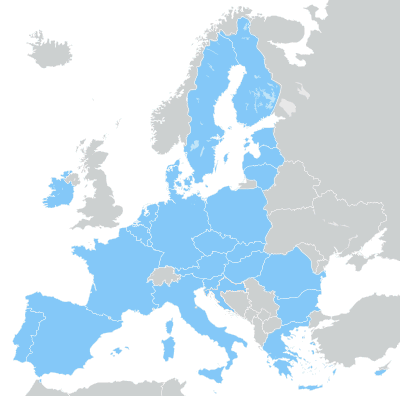Re: European Union
Belgium, Netherlands against EU warming to Serbia; want war crimes suspects in court first
BRDO PRI KRANJU, Slovenia: Widening a rift over Serbia, Belgium and the Netherlands said they oppose steps to quickly make the Balkan nation an EU candidate, saying Belgrade must first deliver key suspects to the Yugoslav war crimes tribunal.
Ahead of a meeting of EU foreign ministers Friday and Saturday, the Belgian and Dutch ministers said in a newspaper article that the EU would lose all credibility if it lowered its membership criteria for Serbia.
To join the bloc, EU candidates must be democracies, have functioning market economies and a clean human rights record.
Radovan Karadzic, the Bosnian Serb wartime political leader, and his military commander Ratko Mladic, remain at large. They have been indicted by the U.N. war crimes tribunal in The Hague, Netherlands, for genocide and other crimes, including the slaughter of up to 8,000 Muslim men and boys at Srebrenica, during Bosnia's 1992-95 war.
NATO officials believe supporters help keep them out of sight. Mladic is believed to be hiding in Serbia, but there has been no word about Karadzic's whereabouts for years.
Serbia insists it is cooperating with the war crimes tribunal, but that it can't locate Karadzic nor Mladic.
That view has found some sympathy at the European Commission.
Ollie Rehn, the EU enlargement affairs commissioner, said Friday that "full cooperation means (Serbia) must do everything in its power ... to arrest and transfer" Karadzic and Mladic to The Hague. But, he said, Serbia has in recent years handed over about 20 war crimes suspects.
Still, the Netherlands and Belgium want to see top suspects of the Balkan wars delivered to the Yugoslav war crimes tribunal.
In the Op-ed article in Friday's Belgian daily De Standaard, Foreign Ministers Karel De Gucht of Belgium and Maxime Verhagen of the Netherlands said: "Mladic's arrest and his transfer to The Hague are the best proof Serbia wants to be part of Europe and embrace European values" of democracy and rule of law.
"Serbia belongs in Europe. But unlike other EU nations, we do not want to achieve that goal by weakening the (membership) conditions the EU has put to Serbia," the ministers said.
They added that Serbia "must meet all criteria" before the EU signs a pre-membership Stabilization and Association accord with the Balkan country. That deal collapsed in mid-February when most of the 27 EU nations began recognizing Kosovo's independence. Belgrade says Kosovo remains a Serbian province.
The Netherlands has been most opposed to a pre-EU membership deal for Serbia, a view that stems from a national trauma over the inability of Dutch U.N. peacekeepers to prevent the Srebrenica massacre by Mladic-commanded troops.
De Gucht and Verhagen said "full cooperation with the Yugoslav tribunal" is a crucial condition for the signing of the agreement. "As a potential member of the European family, Serbia must abide by those norms ... Serbia will have to face its recent past and come clean. Ratko Mladic faces charges of crimes against humanity, the worst crimes committed in Europe since World War II."
The Netherlands has already vetoed the pre-membership accord with Serbia, but France and Sweden keep pushing their EU partners to grant Serbia official candidate status.
"We want Serbia to be given official EU candidate country status as soon as possible, and are prepared to help Serbia to move toward accession," Bernard Kouchner and Carl Bildt, the French and Swedish foreign ministers respectively, wrote in a joint article in six European newspapers on March 12.
The Belgian and Dutch foreign ministers rejected that out of hand.
"A quick signing of a Stabilization and Association Agreement must not be the bait to help pro-European Serbia politicians to an electoral victory," they wrote.
"It would show little respect of our own rules (and) there is no guarantee that easing the (membership) conditions will lead to more stability in the Western Balkans and to reforms in Serbia itself. Dropping the requirement of full cooperation with the Yugoslav tribunal will only play into the hands of nationalist forces in Serbia."
They added, "We are not out to alienate Serbia. Our main aim is to prevent the EU from alienating itself. ... The values underpinning our successful cooperation in democracy, freedom and respect for human rights, must not be eroded. That would greatly harm the union's credibility if it bartered away its own conditions. We must not go down that road."



 Some even had holes in them. So now that the Euro has taken over every countries' separate currency, so how far does that go? If you go to Russia, you need to exchange to...rubles or rupees is it?
Some even had holes in them. So now that the Euro has taken over every countries' separate currency, so how far does that go? If you go to Russia, you need to exchange to...rubles or rupees is it? 
 I believe that we're a bit different from the rest of Europe in that it's our green and communist parties that are actively against membership - in the rest of Europe I seem to remember it's totally different. Am I right, Perun (you seem to know a lot about this)?
I believe that we're a bit different from the rest of Europe in that it's our green and communist parties that are actively against membership - in the rest of Europe I seem to remember it's totally different. Am I right, Perun (you seem to know a lot about this)?